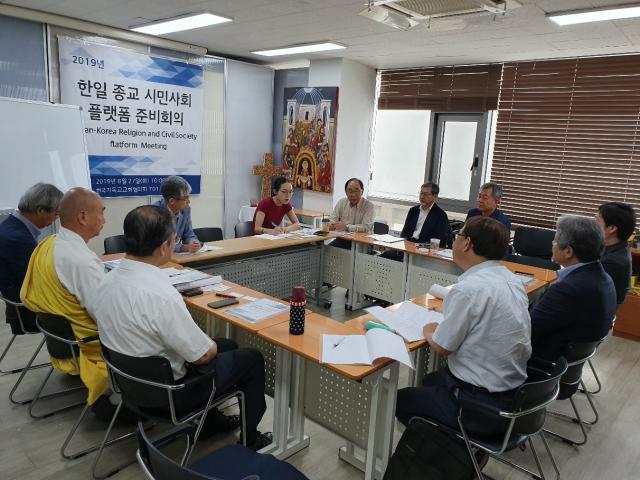
Travel bans present challenges to those seeking to heal old wounds.
 Groups from South Korea and Japan form the Korea-Japan Reconciliation and Peace Platform.
Groups from South Korea and Japan form the Korea-Japan Reconciliation and Peace Platform.
Representatives pictured here discuss peace-making strategies.
Credit: National Council of Churches in Korea
Gifts to Mission & Service support peace and reconciliation processes across the globe. In Japan and Korea, the church’s peace-making efforts have never been more critical as COVID-19 heightens tensions.
According to South Korea, Japan has not formally acknowledged the reportedly state-sanctioned massacre of thousands of Koreans in Japan after a 1923 earthquake, nor the suffering of Korean “comfort women” forced into sexual slavery during World War II. The scars of trauma continue to strain relationships between the two countries.
The relationship between Japan and Korea was at an all-time low before COVID-19 struck, but travel bans have driven an even deeper wedge between neighbours. While travel restrictions seem like necessary precautions, they presented challenges to partners seeking to heal wounds rooted in the 1910‒1945 Japanese colonial period and its brutal occupation of the Korean peninsula.
So in July this year, representatives from 16 civil society and religious organizations from South Korea and Japan respectively—including Mission & Service partners—gathered online to promote participation and solidarity in peace-making, launching the Korea-Japan Reconciliation and Peace Platform. At the launching ceremony held online simultaneously in Seoul and Tokyo, the alliance outlined the goals of the platform: to promote correct understanding of the two countries’ shared history and move toward right relations by healing the wounds of victims. Among other things, the alliance committed to work together to realize a nuclear-free Northeast Asia and promote a common vision for peace among the Asia Pacific regional community. A key focus is to develop young leadership in both countries through human rights and peace education.
Patti Talbot, the United Church’s team leader for Northeast Asia partnerships, explains that the denomination’s involvement today is a continuation of the faithful, peace-making work that our missionaries have long supported.
“Canadian missionaries related to the United Church have served, lived, died, and are buried in what is now North Korea as well as what is now South Korea. United Church missionaries served in Korea during the Japanese occupation, the Korean war, and the immediate aftermath,” says Talbot. “The yearning of Mission & Service partners for peace is shared by United Church people and by many, many Canadians who are connected to the region through family, friends, and church relationships as well as commerce, education, arts, culture, and more.”
Your gifts through Mission & Service support vital peace processes across the globe. Thank you for helping to build a better world.